北京版小学二年级英语
北京版二年级英语课文最终版.最终版.docx

2 (1)G et up.Get up.What time is it?It’s seven o’clock.What time is it?It’s seven thirty.It’s time to go to school.Have a nice day!(2)W hen do you have your dancing lessons?At four thirty.Let’s play first.When do you go home,Yangyang?At five thirty.It’s five therty now.Let’s go home.(3)W hen do you watch the cartoons?At five fifty.Let’s turn on the TV.What time is it?It’s nine twenty.It’s time to go to bed.Sleep tight!Good night!(4)W hat time is it, Dad?I t’s six thirty.It’s time for breakfast.What’s for breakfast, Mum?We have bread,milk,eggs,and fruits.Some milk,bread,and an egg for me ,please. (5)C an I have fish and rice, please?Yes.Here you are.Meat and noodles for me, please?Sure.Let’s sit down.Yangyang, what do you have for lunch?I have a hamburger and ice cream.(6)M um,I’ m back. I’m hungry.Hello, dear. Have an orange first.What’s for supper?We have rice,fish, and vegetables.Good evening, Dad!Hi, Baobao.I’m thirsty.Have a glass of water, please.Thank you.(7)W elcome to my house!Thank you!Would you like to come to my room?Yes,we’d love to.Your bed is big.You have a nice chair.Would you like to sit on it?2Thank you.(8)I’m thirsty.Let’s go to the kitchen.Wow, you have a big fridge there.I’d like to have some apple juice.Would you like to use the glass on the table?No, thank you.(9)C an I use the bathroom, please?Sure. It’s over there.I want to call my mum. Can I use your phone, please?Yes. Go ahead.(10)Where is my shirt? I can’t find it .Loo k! It’s under the bed.Oh, yes! Thank you, Mum.Where is my coat, Dad?Sorry, I don’t know.It’s behind the sofa.(11)Is this your jacket, Yangyang?No, it isn’t.Is this your jacket, Baobao?Yes, it is.Is that your red scarf, Baobao?No, it isn’t.Where is your red scarf?It’s in my schoolbag.(12)Are these your shorts?No, they are not.Where are your trousers?I don’t know. I can’t find them.(13)How do you go to school every day, Amy?On the school bus. How about you?I go to school by bus.When do you go to work, Uncle?At seven thirty.How do you go to work?I go to work by car.(14)How does your dad go to work, Baobao?He goes to work by car.How does your mum go to work?She goes to work by bike. How about your mum?She goes to work on foot.(15)How do you go to the farm on Saturday?We go to the farm by subway.Does your grandpa to with you?Yes, he does.Does your uncle come to see you on Sunday?2Yes, he does.Does he come by taxi?No, he doesn’t.(16)How many seasons are there in a year?They are spring, summer, autumn, and winter.They are four.I like summer. The sky is blue. The grass and leaves are green.I like winter. I like the white snow.(17)Do you like spring, Lingling?Yes, I do. I like the colourful flowers. How about you?I like autumn. It’s cool in autumn.Do you like winter?No, I don’t like winter. It’s cold in winter.But I like winter. I can make a snowman.(18)Which season do you like?I like spring. I can fly a kite.I like summer. I go swimming in summer.Which season do you like?I like autumn. We can pick apples.I like winter. We go ice-skating.。
北京版二年级全册英语知识点

二年级英语上册知识点总结Unit 11.句子:功能句型:1)This panda is old and fat. That monkey is young and thin.2)Do you like cats? Yes, I do. I like dogs ,too.3)There are so many toys here.These toys are so lovely.课文重点句:1) They are so cute.2) Look at the four baby cats.3) Look at those animals.2.语法点:1) be + 形容词2) Do you like…? Yes, I d o. 3) there are…4) 名词复数---- cats, dogs… 5) 冠词the3.词汇:动物:panda, monkey, bear, zebra, kangaroo, giraffe, pig, sheep, horse, donkey, rooster, hen, turkey, goose, dog, cat, tiger, elephant形容词:old, young, fat, thin,cute,lovely , cool数词:three, four, five, nine, eight,动词:go, see, look 4.语音:a, ey, ee, o, i ,er,Unit 21 功能句式:What color is your hair? It’s white. I have short arms and small hands. I have long arms but short legs. I am tall. 2语法点:a.名词的复数形式, legs arms, ears, eyes,不规则变化foot---feet。
b. 介词and和but。
北京版一年级起点小学英语二年级上(英语单词表)

北京版一年级起点小学英语二年级上(英语单词表,带发音)Lesson 1Lesson 2Lesson 3what英音 [w ɒt]美音 [w ʌt]pron. 什么;多么;多少 adv. 到什么程度,在哪一方面 adj. 什么;多么;何等 int. 什么;…day英音 [de ɪ]美音 [de ɪ]n. 一天;时期;白昼 adj. 日间的;逐日的adv. 每天;经常在白天地it英音 [ɪt]美音 [ɪt]abbr. 信息技术information technology abbr. 意大利Italy;意大利的ItalianTuesday英音 [ˈtjuːzde ɪ]美音 [ˈtu ːzde ɪ]n. 星期二I英音 [a ɪ]美音 [a ɪ]n. 碘元素;英语字母I pron. 我Wednesday英音 [ˈwenzde ɪ]美音 [ˈwenzde ɪ]n. 星期三go英音 [ɡəʊ]美音 [ɡo ʊ]n. 去;进行;尝试 vi. 走;达到;运转;趋于vt. 忍受;出产;以…打赌 [复数 goes 第三…on英音 [ɒn]美音 [ɑːn]adv. 向前地;作用中,行动中;继续着 prep.向,朝……;关于;在……之上;在……时候…are英音 [ɑ:(r)]美音 [ər; ɑːr; er]v. 是(be的第二人称单复数现在式) n. 公亩in英音 [ɪn]美音 [ɪn]prep. 按照(表示方式);从事于;在…之内n. 执政者;门路;知情者 adj. 在里面的;时…a英音 [ə]美音 [ə; e ɪ]n. 字母A;第一流的;学业成绩达最高标准的评价符号 abbr. [物]安(ampere)week英音 [wi ːk]n. 周,星期Lesson 5Lesson 6Lesson 7美音 [wi ːk]do英音 [du ː; d ə; du; d əʊ]美音 [du ː; d ə; du; do ʊ]vi. 行,足够;生长 n. 要求;规定;C大调音阶中的第一音 v. 做;干;学习;研究;进行…you英音 [ju]美音 [ju ː; j ə]pron. 你;你们park英音 [pɑːk]美音 [pɑːrk]n. 公园;[交] 停车场 vt. 停放;放置;寄存 vi.停放车辆class英音 [klɑːs]美音 [klæs]n. 阶级;班级;种类;班;等级 adj. 极好的;很好的,优秀的,出色的 vt. 分类;把……we英音 [wi; wi ː]美音 [wi]pron. 我们(主格);笔者,本人(作者或演讲人使用);朕,寡人to英音 [t ə]美音 [t ə; tu; tu ː]prep. 到;向;(表示时间、方向)朝…方向adv. 向前;(门等)关上the英音 [ðə]美音 [ðə; ði; ði ː]art. 这;那 adv. 更加(用于比较级,最高级前)Sunday英音 [ˈs ʌnde ɪ]美音 [ˈs ʌnde ɪ]n. 星期日;礼拜日zoo英音 [zu ː]美音 [zu ː]n. 动物园; <美俚>(铁路货车的最后一节)守车; <美俚>核粒子园Saturday英音 [ˈsæt əde ɪ]美音 [ˈsæt ərde ɪ]n. 星期六film英音 [f ɪlm]美音 [f ɪlm]n. 电影;薄膜;胶卷;轻烟 vt. 在…上覆以薄膜;把…拍成电影 vi. 摄制电影;生薄膜;变…Lesson 9Lesson 10grandma 英音 [ˈɡrænmɑː]美音 [ˈɡrænmɑː]n. 奶奶;外婆grandmother 英音 [ˈɡrænm ʌðə(r)]美音 [ˈɡrænm ʌðər]n. 祖母;女祖先 vt. 当…的祖母 vi. 当祖母grandpa 英音 [ˈɡrænpɑː]美音 [ˈɡrænpɑː]n. 爷爷;外公grandfather 英音 [ˈɡrænfɑːðə(r)]美音 [ˈɡrænfɑːðər]n. 祖父;始祖 vt. 不受新规定限制or 英音 [ɔː(r)]美音 [ɔːr]conj. 或,或者;还是is 英音 [ɪz]美音 [ɪz]v. 是(be的三单形式) n. 存在eleven英音 [ɪˈlev(ə)n]美音 [ɪˈlevn]num. 十一;十一个 n. 十一;十一个 adj. 十一的;十一个的his 英音 [h ɪz]美音 [h ɪz; ɪz]pron. 他的her 英音 [h ə(r)]美音 [h ər; ɜːr; ər; h ɜːr]pron. 她(she的宾格);她的(she的所有格);她(指某个国家;一艘船)how many na. 多少pig英音 [p ɪɡ]美音 [p ɪɡ]n. 猪;猪肉 vi. 生小猪;像猪一样过活 n. 警察(俚语,带有攻击性)your英音 [j ɔː(r); j ə(r)]美音 [j ʊr; j ər]pron. 你的,你们的sixteen英音 [ˌs ɪks ˈti ːn]美音 [ˌs ɪks ˈti ːn]num. 十六 adj. 十六的,十六个的my 英音 [ma ɪ]美音 [ma ɪ]pron. 我的 int. 哎呀(表示惊奇等);喔唷cown. 奶牛,母牛;母兽 vt. 威胁,恐吓Lesson 11Lesson 13Lesson 14Lesson 15英音 [ka ʊ]美音 [ka ʊ]nineteen英音 [ˌna ɪn ˈti ːn]美音 [ˌna ɪn ˈti ːn]num. 十九our英音 [ɑː(r)]美音 [ɑːr]pron. 我们的two 英音 [tu ː]美音 [tu ː]num. 二 n. 两个 adj. 两个的three 英音 [θri ː]美音 [θri ː]num. 三 n. 三,三个 adj. 三的,三个的after英音 [ˈɑːft ə(r)]美音 [ˈæft ər]conj. 在……之后 prep. 在……之后 adj. 以后的adv. 后来,以后elephant英音 [ˈel ɪf ənt]美音 [ˈel ɪf ənt]n. 象;大号图画纸yes 英音 [jes]美音 [jes]n. 是(表示肯定) adv. 是, 是的four英音 [f ɔː(r)]美音 [f ɔːr]num. 四;四个 adj. 四的;四个的baby英音 [ˈbe ɪbi]美音 [ˈbe ɪbi]n. 婴儿,婴孩;孩子气的人 adj. 婴儿的;幼小的 vt. 纵容,娇纵;把……当婴儿般对待cat英音 [kæt]美音 [kæt]n. 猫,猫科动物thin英音 [θɪn]美音 [θɪn]n. 细小部分 adj. 薄的;瘦的;稀薄的;微弱的 vt. 使瘦;使淡;使稀疏 vi. 变薄;变瘦;…dog英音 [d ɒɡ]美音 [d ɔːɡ]n. 狗;丑女人;卑鄙的人;(俚)朋友 vt. 跟踪;尾随Lesson 17Lesson 18Lesson 19toy 英音 [t ɔɪ]美音 [t ɔɪ]n. 玩具;小装饰品;不值钱的东西 adj. 作为玩具的;玩物似的 vi. 玩弄;调情;随随便…monkey 英音 [ˈm ʌŋki]美音 [ˈm ʌŋki]n. 猴子;顽童 vi. 胡闹;捣蛋 vt. 嘲弄these 英音 [ði ːz]美音 [ði ːz]adj. 这些的 pron. 这些them英音 [ðəm; ðem]美音 [ðəm; ðem]pron. 他们;它们;她们no 英音 [n əʊ]美音 [no ʊ]adv. 不 adj. 没有;不是 n. 不;否决票 abbr.数字(number);元素锘(nobelium)的…ear英音 [ɪə(r)]美音 [ɪr]n. 耳朵;穗;听觉;倾听 vi. (美俚)听见;抽穗red英音 [red]美音 [red]n. 红色,红颜料;赤字 adj. 红色的;红肿的,充血的eye英音 [a ɪ]美音 [a ɪ]n. 眼睛;视力;眼光;见解,观点 vt. 注视,看hair英音 [he ə(r)]美音 [her]n. 头发;毛发;些微 adj. 毛发的;护理毛发的;用毛发制成的 vt. 除去…的毛发 vi. 生长…long英音 [l ɒŋ]美音 [l ɔːŋ]n. 长时间;[语] 长音节;(服装的)长尺寸;长裤 adj. 长的;过长的;做多头的;长时间…and英音 [ənd]美音 [ənd; ən; n; ænd]conj. 和,与;就;而且;但是;然后short英音 [ʃɔːt]美音 [ʃɔːrt]n. 短;缺乏;短路;短裤 adj. 短的;不足的;矮的,低的 adv. 不足;突然;唐突地me英音 [mi; mi ː]美音 [mi; mi ː]pron. 我(宾格) n. 自我;极端自私的人;自我的一部分Lesson 21Lesson 22arm 英音 [ɑːm]美音 [ɑːrm]n. 手臂;武器;袖子;装备;部门 vt. 武装;备战 vi. 武装起来leg英音 [leɡ]美音 [leɡ]n. 腿;支柱body英音 [ˈb ɒdi]美音 [ˈbɑːdi]n. 身体;主体;大量;团体;主要部分 vt. 赋以形体small 英音 [sm ɔːl]美音 [sm ɔːl]n. 小件物品;矮小的人 adj. 少的,小的;微弱的;几乎没有的;不重要的;幼小的 adv.…hand英音 [hænd]美音 [hænd]n. 手,手艺;帮助;指针;插手 vt. 传递,交给;支持;搀扶thank英音 [θæŋk]美音 [θæŋk]n. 感谢 vt. 感谢 int. 谢谢old英音 [əʊld]美音 [o ʊld]adj. 陈旧的,古老的;年老的 n. 古时eight 英音 [e ɪt]美音 [e ɪt]num. 八;八个;第八 n. 八字形 adj. 八的cake英音 [ke ɪk]美音 [ke ɪk]n. 蛋糕;块状物;利益总额 vt. 使结块 vi. 结成块状look英音 [l ʊk]美音 [l ʊk]vt. 看;期待;注意;面向;看上去像 vi. 看;看起来;注意;面向 n. 看;样子;面容at英音 [ət]美音 [ət; æt]prep. 在(表示存在或出现的地点、场所、位置、空间);以(某种价格、速度等);向…tree英音 [tri ː]美音 [tri ː]n. 树;木料;树状物 vt. 把...赶上树 vi. 爬上树;逃上树big英音 [b ɪɡ]美音 [b ɪɡ]adj. 大的;重要的;量大的 adv. 大量地;顺利;夸大地Lesson 23new英音 [njuː]美音 [nuː]adj. 新的,新鲜的;更新的;初见的 adv. 新近year英音 [jɪə(r)]美音 [jɪr]n. 年;年度;历年;年纪;一年的期间;某年级的学生。
北京版小学二年级英语全部知识点梳理
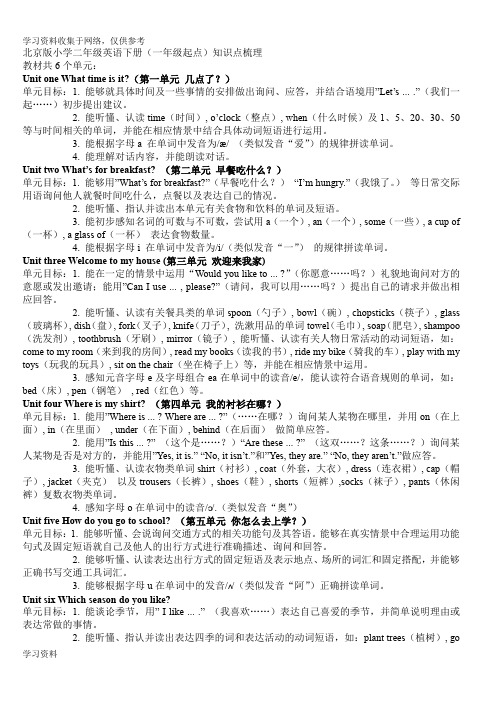
北京版小学二年级英语下册(一年级起点)知识点梳理教材共6个单元:Unit one What time is it?(第一单元几点了?)单元目标:1. 能够就具体时间及一些事情的安排做出询问、应答,并结合语境用”Let’s ... .”(我们一起……)初步提出建议。
2. 能听懂、认读time(时间), o’clock(整点), when(什么时候)及1、5、20、30、50等与时间相关的单词,并能在相应情景中结合具体动词短语进行运用。
3. 能根据字母a 在单词中发音为/æ/ (类似发音“爱”)的规律拼读单词。
4. 能理解对话内容,并能朗读对话。
Unit two What’s for breakfast? (第二单元早餐吃什么?)单元目标:1. 能够用”What’s for breakfast?”(早餐吃什么?)“I’m hungry.”(我饿了。
)等日常交际用语询问他人就餐时间吃什么,点餐以及表达自己的情况。
2. 能听懂、指认并读出本单元有关食物和饮料的单词及短语。
3. 能初步感知名词的可数与不可数,尝试用a(一个), an(一个), some(一些), a cup of (一杯), a glass of(一杯)表达食物数量。
4. 能根据字母i 在单词中发音为/i/(类似发音“一”)的规律拼读单词。
Unit three Welcome to my house (第三单元欢迎来我家)单元目标:1. 能在一定的情景中运用“Would you like to ... ?”(你愿意……吗?)礼貌地询问对方的意愿或发出邀请;能用”Can I use ... , please?”(请问,我可以用……吗?)提出自己的请求并做出相应回答。
2. 能听懂、认读有关餐具类的单词spoon(勺子), bowl(碗), chopsticks(筷子), glass (玻璃杯), dish(盘), fork(叉子), knife(刀子), 洗漱用品的单词towel(毛巾), soap(肥皂), shampoo (洗发剂), toothbrush(牙刷), mirror(镜子), 能听懂、认读有关人物日常活动的动词短语,如:come to my room(来到我的房间), read my books(读我的书), ride my bike(骑我的车), play with my toys(玩我的玩具), sit on the chair(坐在椅子上)等,并能在相应情景中运用。
二年级英语北京版上册
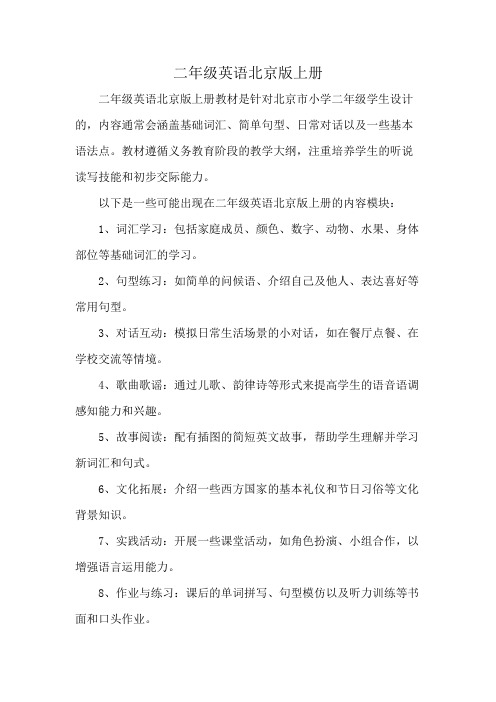
二年级英语北京版上册
二年级英语北京版上册教材是针对北京市小学二年级学生设计的,内容通常会涵盖基础词汇、简单句型、日常对话以及一些基本语法点。
教材遵循义务教育阶段的教学大纲,注重培养学生的听说读写技能和初步交际能力。
以下是一些可能出现在二年级英语北京版上册的内容模块:
1、词汇学习:包括家庭成员、颜色、数字、动物、水果、身体部位等基础词汇的学习。
2、句型练习:如简单的问候语、介绍自己及他人、表达喜好等常用句型。
3、对话互动:模拟日常生活场景的小对话,如在餐厅点餐、在学校交流等情境。
4、歌曲歌谣:通过儿歌、韵律诗等形式来提高学生的语音语调感知能力和兴趣。
5、故事阅读:配有插图的简短英文故事,帮助学生理解并学习新词汇和句式。
6、文化拓展:介绍一些西方国家的基本礼仪和节日习俗等文化背景知识。
7、实践活动:开展一些课堂活动,如角色扮演、小组合作,以增强语言运用能力。
8、作业与练习:课后的单词拼写、句型模仿以及听力训练等书面和口头作业。
具体到每一课的具体内容,请参阅当年的北京版二年级英语上册教材或相关教学资源。
由于教材可能会更新改版,建议查询最新版本的教材内容。
北京版一年级起点小学英语二年级下(英语单词表)

北京版一年级起点小学英语二年级下(英语单词表,带发音)Lesson 1Lesson 2Lesson 3time英音 [ta ɪm]美音 [ta ɪm]n. 时间;时代;次数;节拍;倍数 adj. 定时的;定期的;分期的 vt. 计时;测定…的时…o'clock abbr. …点钟(等于of the clock)nice英音 [na ɪs]美音 [na ɪs]adj. 精密的;美好的;细微的;和蔼的when英音 [wen]美音 [wen]conj. 考虑到;既然;当…时;在…时;如果 n.时间,时候;日期;场合 adv. 什么时候,何…thirty英音 [ˈθɜːti]美音 [ˈθɜːrti]num. 三十 n. 三十年代 adj. 三十个的home英音 [h əʊm]美音 [ho ʊm]n. 家,住宅;产地;家乡;避难所 adj. 国内的,家庭的;有效的 vt. 归巢,回家 adv. 在 (iv)英音 [fa ɪv]美音 [fa ɪv]num. 五,五个 n. 五,五个;五美元钞票 adj.五的;五个的fifty英音 [ˈf ɪfti]美音 [ˈf ɪfti]n. 五十;五十个;编号为50的东西 adj. 五十的;五十个的;众多的nine英音 [na ɪn]美音 [na ɪn]n. 九,九个 num. 九;九个 adj. 九的,九个的twenty英音 [ˈtwenti]美音 [ˈtwenti]num. 二十 n. 二十;二十年代 adj. 二十的sleep英音 [sli ːp]美音 [sli ːp]n. 睡眠 vi. 睡,睡觉Lesson 5Lesson 6good 英音 [ɡʊd]美音 [ɡʊd]n. 好处;善行;慷慨的行为 adj. 好的;优良的愉快的虔诚的d 好one 英音 [w ʌn]美音 [w ʌn]pron. 一个人;任何人 adj. 一的;唯一的 n.一 num. 一;一个dad英音 [dæd]美音 [dæd]n. 爸爸;爹爹for英音 [f ə(r)]美音 [f ər; f ɔːr]prep. 为,为了;因为;给;对于;至于;适合于 conj. 因为bread英音 [bred]美音 [bred]n. 面包;生计 vt. 在…上洒面包屑milk英音 [m ɪlk]美音 [m ɪlk]n. 牛奶;乳状物 vt. 榨取;挤…的奶 vi. 挤奶egg英音 [eɡ]美音 [eɡ]n. 蛋;卵子;家伙;鸡蛋 vt. 煽动;怂恿an英音 [ən]美音 [ən; æn]art. 一(在元音音素前)fish英音 [f ɪʃ]美音 [f ɪʃ]n. 鱼,鱼类 vt. 钓鱼,捕鱼;搜寻 vi. 捕鱼,钓鱼;用钩捞取rice 英音 [ra ɪs]美音 [ra ɪs]n. 稻;米饭 vt. 把…捣成米糊状noodle英音 [ˈnu ːd(ə)l]美音 [ˈnu ːd(ə)l]n. 面条;笨蛋down 英音 [da ʊn]美音 [da ʊn]prep. 沿着,往下 n. 软毛,绒毛;[地质] 开阔的高地 adj. 向下的 vt. 打倒,击败 adv. 向…ice cream 英音 [ˈa ɪs kri ːm]美音 [ˈa ɪs kri ːm]n. 【食】冰淇淋Lesson 9back英音 [bæk]美音 [bæk]n. 后面;背部;靠背;足球等的后卫;书报等的末尾 adj. 后面的;过去的;拖欠的 vt. 支…hungry英音 [ˈh ʌŋɡri]美音 [ˈh ʌŋɡri]adj. 饥饿的;渴望的;荒年的;不毛的hello英音 [h əˈl əʊ]美音 [h əˈl əʊ]n. 表示问候, 惊奇或唤起注意时的用语 int.喂;哈罗dear英音 [d ɪə(r)]美音 [d ɪr]n. 亲爱的人 adj. 亲爱的;尊敬的;昂贵的adv. 高价地;疼爱地 int. 哎呀orange英音 [ˈɒr ɪnd ʒ]美音 [ˈɔr ɪnd ʒ]adj. 橙色的;橘色的 n. 橙;橙色;桔子vegetable英音 [ˈved ʒt əb(ə)l]美音 [ˈved ʒt əbl]n. 蔬菜;植物;植物人 adj. 蔬菜的;植物的evening英音 [ˈi ːvn ɪŋ]美音 [ˈi ːvn ɪŋ]n. 晚上;傍晚;(联欢性的)晚会;后期 adj.在晚上的;为晚上的;晚上用的 int. 晚上好…room英音 [ru ːm]美音 [ru ːm; r ʊm]n. 房间;空间;余地;机会;房间里所有的人vt. 为…提供住处;租房,合住;投宿,住宿…love英音 [l ʌv]美音 [l ʌv]n. 恋爱;亲爱的;酷爱;喜爱的事物;爱情,爱意;疼爱;热爱;爱人,所爱之物 v. 爱,…bed英音 [bed]美音 [bed]n. 床;基础;河底, 海底 vt. 使睡觉;安置,嵌入;栽种 vi. 上床;分层big英音 [b ɪɡ]美音 [b ɪɡ]adj. 大的;重要的;量大的 adv. 大量地;顺利;夸大地chair英音 [t ʃe ə(r)]美音 [t ʃer]n. 椅子;讲座;(会议的)主席位;大学教授的职位 vt. 担任(会议的)主席;使...入座; (i)英音 [s ɪt]美音 [s ɪt]vi. 坐;位于 vt. 使就座Lesson 11Lesson 13kitchen英音 [ˈk ɪt ʃɪn]美音 [ˈk ɪt ʃɪn]n. 厨房;炊具;炊事人员fridge英音 [fr ɪd ʒ]美音 [fr ɪd ʒ]n. 电冰箱table英音 [ˈte ɪb(ə)l]美音 [ˈte ɪbl]n. 桌子;表格;平地层 vt. 制表;搁置;嵌合adj. 桌子的bathroom英音 [ˈbɑːθru ːm; ˈbɑːθr ʊm]美音 [ˈbæθru ːm]n. 浴室;厕所;盥洗室want英音 [w ɒnt]美音 [wɑːnt]n. 需要;缺乏;贫困;必需品 vt. 需要;希望;应该;缺少 vi. 需要;缺少call英音 [k ɔːl]美音 [k ɔːl]n. 电话;呼叫;要求;访问 vi. 呼叫;拜访;叫牌 vt. 呼叫;称呼;召集mum英音 [m ʌm]美音 [m ʌm]adj. 沉默的 n. 妈妈(口语);沉默;菊花 vi.演哑剧 int. 别说话phone英音 [f əʊn]美音 [fo ʊn]n. 电话;耳机,听筒 vt. 打电话 vi. 打电话where英音 [we ə(r)]美音 [wer]conj. 在…的地方 n. 地点 adv. 在哪里 pron. 哪里shirt 英音 [ʃɜːt]美音 [ʃɜːrt]n. 衬衫;汗衫,内衣find英音 [fa ɪnd]美音 [fa ɪnd]n. 发现 vi. 裁决 vt. 查找,找到;发现;认为;感到;获得coat英音 [k əʊt]美音 [ko ʊt]n. 外套 vt. 覆盖…的表面sofa英音 [ˈs əʊf ə]n. 沙发;长椅Lesson 14Lesson 15Lesson 17美音 [ˈso ʊf ə]this英音 [ðɪs]美音 [ðɪs]adj. 这;本;这个;今 pron. 这;这个;这里adv. 这样地;这么jacket英音 [ˈd ʒæk ɪt]美音 [ˈd ʒæk ɪt]n. 羽绒滑雪衫;西装短外套;短上衣,夹克;土豆皮;书籍的护封;文件套,公文夹 vt.…that英音 [ðæt]美音 [ðæt]conj. 因为;以至于 adj. 那;那个 pron. 那;那个 adv. 那么;那样schoolbag英音 [ˈsku ːlbæɡ]美音 [ˈsku ːl ˌbæɡ]n. 书包shorts英音 [ʃɔːts]美音 [ʃɔːrts]n. 短裤not英音 [n ɒt]美音 [nɑːt]adv. 表示否定,不 n. “非”(计算机中逻辑运算的一种)bag英音 [bæɡ]美音 [bæɡ]n. 袋;猎获物;(俚)一瓶啤酒 vt. 猎获;把…装入袋中;占据,私吞;使膨大 vi. 松垂trousers英音 [ˈtra ʊz əz]美音 [ˈtra ʊz ərz]n. 裤子,长裤how英音 [ha ʊ]美音 [ha ʊ]adv. 如何;多少;多么 n. 方法;方式 conj.如何bus 英音 [b ʌs]美音 [b ʌs]n. 公共汽车 乘公共汽车by英音 [ba ɪ]美音 [ba ɪ]prep. 通过;被;依据;经由;在附近;在……之前 adv. 通过;经过;附近;[互联网] 白俄…car英音 [kɑː(r)]美音 [kɑːr]n. 汽车;车厢Lesson 18Lesson 19Lesson 21work英音 [w ɜːk]美音 [w ɜːrk]n. 工作;[物] 功;产品;操作;职业;行为;事业;工厂;著作;文学、音乐或艺术作品…she英音 [ʃi]美音 [ʃi; ʃi ː]n. 女人;雌性动物 pron. 她(主格);它(用来指雌性动物或国家、船舶、地球、月亮等)bike英音 [ba ɪk]美音 [ba ɪk]n. 自行车;脚踏车 vi. 骑自行车(或摩托车)he英音 [hi; i ː; i; hi ː]美音 [hi; i ː; i; hi ː]n. 男孩,男人;它(雄性动物) pron. 他come英音 [k ʌm]美音 [k ʌm]vi. 来;开始;出现;发生;变成;到达 vt.做;假装;将满(…岁) int. 嗨!taxi英音 [ˈtæksi]美音 [ˈtæksi]n. 出租汽车 vt. 使滑行;用出租车送 vi. 乘出租车;滑行they 英音 [ðe ɪ]美音 [ðe ɪ]pron. 他们;它们;她们sky英音 [ska ɪ]美音 [ska ɪ]n. 天空;顶点 vt. 把…投向空中;把…挂得过高 vi. 踢或击高空球;把桨叶翘得过高;飞涨blue英音 [blu ː]美音 [blu ː]adj. 蓝色的;沮丧的,忧郁的;下流的 n. 蓝色;[复数](美国海、陆、空三军穿的)蓝…green英音 [ɡri ːn]美音 [ɡri ːn]n. 绿色;青春 adj. 绿色的;青春的 vt. 使…变绿色 vi. 变绿色white英音 [wa ɪt]美音 [wa ɪt]n. 白色;洁白;白种人 adj. 白色的;白种的;纯洁的snow英音 [sn əʊ]美音 [sno ʊ]n. 雪,积雪;下雪 vt. 使纷纷落下;使变白 vi.降雪Lesson 22Lesson 23cool英音 [ku ːl]美音 [ku ːl]n. 凉爽;凉爽的空气 adj. 凉爽的;冷静的;出色的 vt. 使…冷却;使…平静下来 vi. 变凉…cold英音 [k əʊld]美音 [k əʊld]n. 寒冷;感冒 adj. 寒冷的;冷淡的,不热情的;失去知觉的 adv. 完全地make英音 [me ɪk]美音 [me ɪk]vt. 使得;进行;布置,准备,整理;制造;认为;获得;形成;安排;引起;构成 vi. …which英音 [w ɪt ʃ]美音 [w ɪt ʃ]adj. 哪一个;哪一些 pron. 哪/那一个;哪/那一些spring英音 [spr ɪŋ]美音 [spr ɪŋ]n. 春天;弹簧;泉水;活力;跳跃 adj. 春天的 vt. 使跳起;使爆炸;突然提出;使弹开 v…。
北京版小学英语二年级上册单词和句型
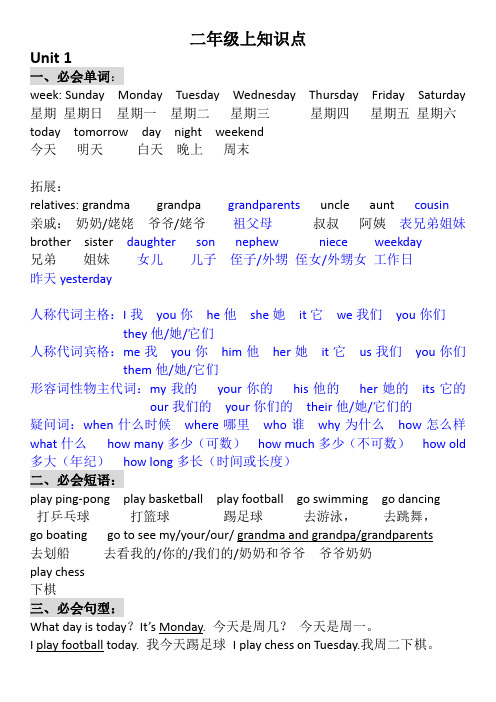
二年级上知识点Unit 1一、必会单词:week: Sunday Monday Tuesday Wednesday Thursday Friday Saturday 星期星期日星期一星期二星期三星期四星期五星期六today tomorrow day night weekend今天明天白天晚上周末拓展:relatives: grandma grandpa grandparents uncle aunt cousin亲戚:奶奶/姥姥爷爷/姥爷祖父母叔叔阿姨表兄弟姐妹brother sister daughter son nephew niece weekday兄弟姐妹女儿儿子侄子/外甥侄女/外甥女工作日昨天yesterday人称代词主格:I我you你he他she她it它we我们you你们they他/她/它们人称代词宾格:me我you你him他her她it它us我们you你们them他/她/它们形容词性物主代词:my我的your你的his他的her她的its它的our我们的your你们的their他/她/它们的疑问词:when什么时候where哪里who谁why为什么how怎么样what什么how many多少(可数)how much多少(不可数)how old 多大(年纪)how long多长(时间或长度)二、必会短语:play ping-pong play basketball play football go swimming go dancing打乒乓球打篮球踢足球去游泳,去跳舞,go boating go to see my/your/our/ grandma and grandpa/grandparents去划船去看我的/你的/我们的/奶奶和爷爷爷爷奶奶play chess下棋三、必会句型:What day is today?It’s Monday. 今天是周几?今天是周一。
I play football today. 我今天踢足球I play chess on Tuesday.我周二下棋。
北京版小学英语二年级上册全套教学设计
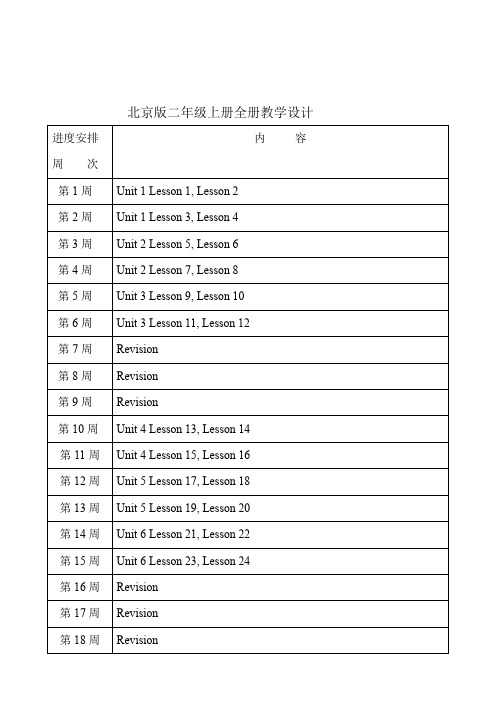
本单元将要学习询问一周七天具体名称What are the seven days in a week?。表示活动安排的句式I play ping-pong today.询问今天是星期几的句型What day is today?
第6周
Unit 3 Lesson11, Lesson12
第7周
Revision
第8周
Revision
第9周
Revision
第10周
Unit4Lesson13, Lesson14
第11周
Unit4Lesson 15,Lesson 16
第12周
Unit5Lesson17, Lesson18
第13周
Unit5Lesson19, Lesson 20
教
学
目
标
1.通过本单元围绕日常活动这一话题的学习,学生能听懂并会询问对方周末有安排如何,并能简短回答。
2.通过本单元话题的学习学生能够能正确地朗读、表演课文。
3.通过Look and read板块的学习学生能够感知字母e以及字母组合ea、ee、ey在单词中的读音?/i:/。
教
学
重
点
学习询问周末对方有无课程及做什么的问答语:I go to the park on weekend.地点和做什么的说法要让学生反复练习。
教
材
简
析
本单元是有关询问对方周末有无课程及周末做什么的问答语。在本单元中将出现两组交际用语,在模拟情景中运用所学语言与他人交流周末的日常活动。学生在本册第一单元重点学习了一周七天的表达以及“What day is today? It’s---. I ---on---”的表达。而一年级下学期学生曾经学习过What do you do in the morning?I go to school。的句型。且已经在第一单元学过了星期的表达。为本单元的句型学习奠定了一定的基础。
北京版英语教材word版 二年级下
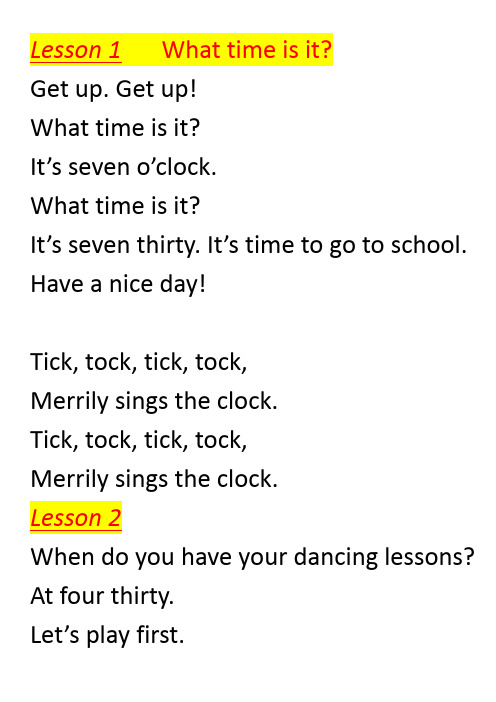
Lesson 1What time is it?Get up. Get up!What time is it?It’s seven o’clock.What time is it?It’s seven thirty. It’s time to go to school. Have a nice day!Tick, tock, tick, tock,Merrily sings the clock.Tick, tock, tick, tock,Merrily sings the clock.Lesson 2When do you have your dancing lessons? At four thirty.Let’s play first.When do you go home, Yangyang?At five thirty.It’s five thirty now. Let’s go home.Go home – five thirty get up- six thirty Go to school- seven thirtygo to bed- nine thirtyTwelve good hours in every day,Time for work and time for play. Twenty-four hours for day and night, Some for darkness and some for light. Lesson 3When do you watch the cartoons?At five fifty.Let’s turn on the TV.What time is it?It’s nine twenty. It’s time to go to bed.Sleep tight!Good night!Nine twenty- go to bedFive fifty- watch the cartoonsOne forty- go to the drawing lessons I have a round face but no eyes.I have two hands but no legs.I have no mouth but I can tell.It’s the time that I can tell. DEPARTURESTIME DESTINATION FLIGHT7:00 SHANGHAI MU51387:10 XI’AN CA12038:20 CHENGDU 3U88969:30 CUANGZHOU CZ3108 10:40 XIAMEN MF811812:50 CHANGSHA CZ3146A bad bag cat jam vanApple/ flag/ glad /panda/ happy/ handA fat cat is sitting on a black mat. Twenty thirty fiftyWhen do you get up?When do you go to school?When do you go home?Lesson 5What time is it, Dad?It’s six thirty. It’s time for breakfast. What’s for breakfase, Mum?We have bread, milk, eggs, and fruits. Some milk, bread, and an egg for me, please.Milk bread eggs fruits soy milk noodlesBread and butter,Spice and sugar,Which is better?Lesson 6Can I have fish and rice, please? Yes. Here you are.Meat and noodles for me, please. Sure.Let’s sit down.Yangyang, what do you have for lunch?I have a hamburger and ice cream. Fish and rice fried ricerice noodles a mantou and a fried egg My little nose smells yummy,yummy foodMy little nose smells nice, nice food.My little mouth tastes yummy,yummy foodMy little mouth tastes nice, nice food Lesson 7Mum, I’m back. I’m hungry.Hello, dear. Have an orange first. What’s for supper?We have rice, fish, and vegetables. Good evening, Dad!Hi, Baobao. I’m thirsty.Have a glass of water, please.Thank you.An orange an egg a hamburgerA hot dog a glass of water a cup of tea A glass of juice a glass of soy milkI screamYou ScreamWe all screamFor ice cream.Lesson 8I fish dish big gift river King six film it singThe big fish in my dish,Is my yummy, yummy dish.Draw three kinds of fruits.Draw three kinds of food.Draw three kinds of drinks.Fish rice vegetablesLesson 9 Welcome to my house Welcome to my house!Thank you!Would you like to come to my room?Yes, we’d love to.Your bed is big!You have a nice chair.Would you like to sit on it? Thank you.Come to my room read my books Ride my bike play with my toys Go to bed, Kate.Take a rest, Kate.Sleepy or not,Go to bed, Kate.Lesson 10I’m thirsty.Let’s go to the kitchen.Wow, you have a big fridge there. I’d like to have some apple juice.Would you like to use the glass on the table?No, thank you.The spoon the chopsticksThe glass the bowlApple juice, orange juice,Drink them with your food.Orange juice, apple juice,They are good for Ruth!Lesson 11Can I use the bathroom, please?Sure. It’s over there.Thank you.I want to call my mum. Can I use your phone, please?Yes. Go ahead.The bathroom the towel the soap The shampoo the toothpasteGet up, Kate.Wake up, Kate.Awake or not,Get up, Kate.Lesson 12A phone a book a chair a bedE bed pen red pet get neck leg desk vest jello yellow egg elephantHead breadPet, pet, get off the bed.Pet, pet, get the pen.The bed is in the bedroom.Bathroom bedroom kitchenBed chair tableWoud you like to look at my room? I have a small bed…This is my bedroom. I have…Lesson 13 Where is my shirt?Where is my shirt? I can’t find it.Look! It’s under the bed.Oh, yes! Thank you, Mum.Where is my coat, Dad?Sorry, I don’t know.It’s behind the sofa.Behind the sofa under the bedIn the box on the deskCoat cap shirt dressWhere are you going, little cat?I am going to town to buy a hat.What? A hat or a cat?A cat with a hat?Lesson 14Is this your jacket, Yangyang? No, it isn’t.Is this your jacket, Baobao? Yes, it is.Is that your red scarf, Baobao? No, it isn’t.Where is your red scarf?It’s in my schoolbag.Jacket watch cap football Lost & FoundYour head is too round,And your face is too flatTo wear a hat.Lesson 15Are these your shorts?No, they are not.Where are your shorts?They are in my bag.Are these your trousers?No, they are not.Where are your trousers?I don’t know. I can’t find them. Trousers shorts socks shoes John, John,Went to bedWith his pants on,One shoe offAnd one shoe on!Lesson 16Shorts shoes trousers a capa shirt a coat socksO box dog ox fox long clock mop top hot The dog, the ox, and the fox, each is carrying a box.This is an eraser. I’m going to hide it. Where is the eraser? It’s behind the door. Shirt shorts coatMake your own riddle.It’s in the..It’s on the..It’s under the..Oh, it is an eraser!Lesson 17 How do you go to school?How do you go to school every day, Amy? On the school bus. How about you?I go to school by bus.When do you go to work, Uncle?At 7:30.How do you go to work?I go to work by car.By bus school the cenemaby bike on foot the zooTrain, plane, and ship,Which will you take?Ship, plane, and train,I will take the plane.Lesson 18How does your dad go to work, Baobao? He goes to work by car.How does your mum go to work?She goes to work by bike. How aboutyour mum?She goes to work on foot.By car by taxi by subwayGo to work your dadGo to see her aunt and uncleLinglingI hope I can fly,I hope I can touch the sky.Spread my wings and fly high,I hope I can fly.Lesson 19How do you go to the farm on Saturday、We go to the farm by subway.Does your grandpa go with you?Yes, he does.Does your uncle come to see you onSunday?Yes, he does.Does he come by taxi?No, he doesn’t.Come by taxiGo to the park by subwayGo to the hospital by busLittle boy, little boy,Do you want to go for a ride?Little bike, little bike,I’d like to go for a ride.Lesson 20A plne a train a ship a taxiU hut nut cup duck lucky bus lunch A lucky duck finds a hut.In that hut there is a cup.In the cup he sees a nut.Car bus bike taxiHow do you come to school?How many come to school by bus? Lesson 21How many seasons are there in a year? There are four.They are spring, summer, autumn, and winter.I like summer. The sky is blue. The grass and leaves are green.I like winter. I like the white snow. Seasons /a year/ fourdays /a week/sevenhours/a day/ 24Summer is hotWe have no school Autumn is coolWe go back to school.Lesson 22Do you like spring, Lingling?Yes, I do. I like the colourful flowers. How about you?I like autumn. It’s cool in autumn.Do you like winter?No, I don’t like winter. It’s cold in winter. But I like winter. I can make a snowman. Do you like winter?Yes, I do./No, I don’t like winter. Spring summer autumn winterSpring, Spring,Let us sing.We are all happyTo sing for spring.Lesson 23Which season do you like?I like spring. I can fly a kite.I like summer. I go swimming in summer. Which season do you like?I like autumn. We can pick apples.I like winter. We go ice-skating. Seasons/spring/fly a kitesummer/go camping/autumn/pick apples/winter/play in the snowSping is brightWith flower and song.Summer is hotAnd the days are long.Autumn is richWith fruits and grain.Winter brings snowAnd a new year again.Lesson 24Colourful flowersWhite snowThe blue skyGreen grassHow many seasons are there in a year? There are four.Which season do you like?I like….Do you like…?Yes, I do. …No, I don’t. …Ar car park star arm card party He has a card for the party in the park. There are many cars in the car park.What’s this?3 says “C”, 15 says “O”, 12 says “L”.It is “COOL”.Green white spring snowI like winter.The snow is white. …。
北京版小学英语二年级下课文及翻译

UNIT ONE WHAT TIME IS IT ? Lesson 1Listen and sayGet up. Get up! 起床啦,起床啦!What time is it? 现在几点了?It's seven o'clock. 七点了。
What time is it? 现在几点了?It's seven thirty. 七点半了。
It's time to go to school. 到了该上学的时间了。
Have a nice day. 祝你过得愉快。
Lesson 2Listen and sayWhen do you have your dancing lessons? 你什么时候上舞蹈课?At four thirty. 在四点半。
Let's play first. 让我们先玩儿会吧。
When do you go home, Yangyang? 阳阳,你什么时候回家?At five thirty. 在五点半。
It's five thirty now. Let's go home. 现在五点半了,让我们回家吧。
Lesson 3Listen and sayWhen do you watch the cartoons? 你什么时候看卡通?At five fifty. 在五点五十。
Let's turn on the TV. 让我们打开电视吧。
What time is it? 现在几点了?It's nine twenty. It's time to go to bed. 九点二十,到了该睡觉的时间了。
Sleep tight! 睡个好觉!Good night!晚安Lesson 4Talk and actwhat time is it?现在几点了?It’s... . It’s time to….现在……,是做...的时间了?When do you...?你什么时候做.... At... 在...Look and reada [æ] :b a d[bæd]坏的 b a g书包c a t 猫j a m 果酱v a n 厢式货车a pple苹果fl a g旗子gl a d高兴的p a nda熊猫h a ppy高兴的h a nd 手A f a t c a t is sitting on a bl a ck m a t. 一只大肥猫坐在一个黑色的垫子上。
北京课改版小学二年级下册-英语重点知识汇总梳理

北京版英语教材知识梳理二年级下册Unit 1 Lesson 1第一部分:词汇第二部分:短语第三部分:交际用语Unit 1 Lesson 2第一部分:词汇第二部分:短语第三部分:交际用语Unit 1 Lesson 3 第一部分:词汇第二部分:短语第三部分:交际用语Unit Two What’s for breakfast? Unit 2 Lesson 5第一部分:词汇第二部分:短语第三部分:交际用语Unit 2 Lesson 6 第一部分:词汇第二部分:短语第三部分:交际用语Unit 2 Lesson 7 第一部分:词汇第二部分:短语第三部分:交际用语Unit Three Welcome to my house Unit3 Lesson9 第一部分:单词第二部分:短语第三部分:句型Unit3 Lesson10第一部分:单词第二部分:短语第三部分:句型Unit3 Lesson11 第一部分:单词第二部分:短语第三部分:句型Unit four Where is my shirt? Unit4 Lesson13第一部分:单词第二部分:短语第三部分:句型Unit4 Lesson14第一部分:单词第二部分:短语第三部分:句型Unit4 Lesson15 第一部分:单词第二部分:短语第三部分:句型Unit five How do you go to school? Unit5 Lesson 17第一部分:词汇第二部分:短语第三部分:交际用语Unit 5 Lesson 18 第一部分:词汇第二部分:短语第三部分:交际用语Unit 5 Lesson 19 第一部分:词汇第二部分:短语第三部分:交际用语Unit6 Lesson 21 第一部分:词汇第二部分:短语第三部分:交际用语Unit6 Lesson 22 第一部分:词汇第二部分:短语第三部分:交际用语Unit6 Lesson 23 第一部分:词汇第二部分:短语第三部分:交际用语。
(完整)北京版英语二年级上册
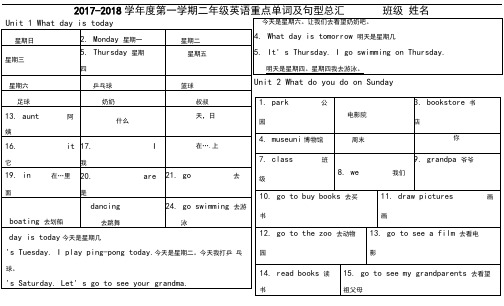
2017-2018学年度第一学期二年级英语重点单词及句型总汇班级姓名Unit 1 What day is todayUnit 2 What do you do on Sunday1.Do you go to the park on Saturday 你星期六去公园吗2.Yes, I do. / No, I don' t.是的,我去。
/ 不,我不去。
3.What do you do on Sunday你星期天做些什么4.I go to the zoo.我去公园。
5.What do you do on Sunday在星期日你做什么6.I often go to see a film.我经常去看电影。
Unit 3 What' s your numberUnit 4 There are many animals.这个动物园里有大象吗2.Yes, there are four.是的,有四头大象°3.Do you like cats你喜欢猫吗4.Yes, I do. I like dogs, too.是的,我喜欢。
我也喜欢狗。
5.Are there monkeys 有猴子吗6.No, there aren, t. There are bears.不,没有。
有熊。
Unit 5 I have long arms.1. What' s this这是什么2. It' s an elephant.它是一头大象。
3. It has a short tail. What animal is it 它有一根长尾巴。
它是什么动物Unit 6 It> s Christmas Day.。
北京版二年级上册英语课文
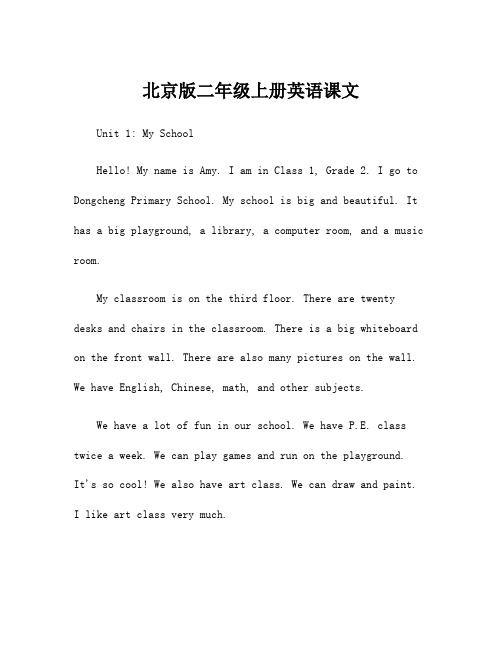
北京版二年级上册英语课文Unit 1: My SchoolHello! My name is Amy. I am in Class 1, Grade 2. I go to Dongcheng Primary School. My school is big and beautiful. It has a big playground, a library, a computer room, and a music room.My classroom is on the third floor. There are twenty desks and chairs in the classroom. There is a big whiteboard on the front wall. There are also many pictures on the wall. We have English, Chinese, math, and other subjects.We have a lot of fun in our school. We have P.E. class twice a week. We can play games and run on the playground.It's so cool! We also have art class. We can draw and paint.I like art class very much.I love my school! I can play with my friends and learn alot of things here. I hope you can come and visit my school one day.Unit 2: My FamilyHello! My name is Tony. This is a photo of my family. In the photo, there are four people. They are my father, my mother, my sister, and me.My father's name is Jack. He is a teacher. He is tall and strong. He likes playing basketball. My mother's name is Lily. She is a nurse. She is kind and beautiful. She likes singing and dancing.My sister's name is Sarah. She is five years old. Shelikes playing with dolls. She is very cute and she loves me very much.I love my family. We often go to the park on weekends. We play games, have a picnic, and have a lot of fun. I am veryhappy to have such a lovely family. I hope you can meet my family one day.Unit 3: My FriendsHello! My name is Lucy. I want to introduce my friends to you. They are Lisa, Mike, and Tom.Lisa is my best friend. She has long hair and big eyes. She is very smart. She likes reading and drawing. We often play together after school.Mike is very funny. He likes telling jokes and making people laugh. He is also good at sports. He can run very fast and jump very high.Tom is a new student in our class. He is very kind and helpful. He always helps us with our homework. He is good at math and English.I love my friends. We often study and play together. I hope we can be good friends forever. Thank you for listening to my introduction.。
北京版二年级英语上册

北京版二年级英语上册Unit 1: My SchoolLesson 1: The ClassroomThis is my classroom. It’s big and clean. There are many desks and chairs in the classroom. The teacher’s desk is in front of the blackboard. There are some pictures on the wall.I love my classroom!Lesson 2: Our SchoolWe have a big and beautiful school. There is a big playground. We play games there. There are many trees and flowers in the school. I like my school.Lesson 3: Introducing MyselfHello, everyone! My name is Wang Lin. I am a boy. I am seven years old. I am in Class One, Grade Two. I like English.I like playing basketball. I like my school.Unit 2: My FamilyLesson 1: My FamilyThis is my family. This is my father. He is a doctor. This is my mother. She is a teacher. This is my sister. She is a student. I love my family.Lesson 2: My HomeThis is my home. It’s big and beautiful. There is a living room, a dining room, three bedrooms, a kitchen, and two bathrooms in my home. I like my home.Lesson 3: My DayI get up at six o’clock. I have b reakfast at seveno’clock. I go to school at seven thirty. I have lunch at twelve o’clock. I go home at five o’clock. I have dinner at six o’clock. I go to bed at nine o’clock. I like my day.Unit 3: My FriendsLesson 1: My FriendThis is my friend. His name is Mike. He is a boy. He is in the same class as me. He likes playing football. I like my friend.Lesson 2: Our ActivitiesWe have many activities at school. We read books, draw pictures, and play games. We have English class, Chinese class, and math class. I like our activities.Lesson 3: My FavoriteMy favorite subject is English. I like English songs. My favorite food is noodles. I like playing with my friends. I like my school life.。
北京出版社英语二年级下英语单词
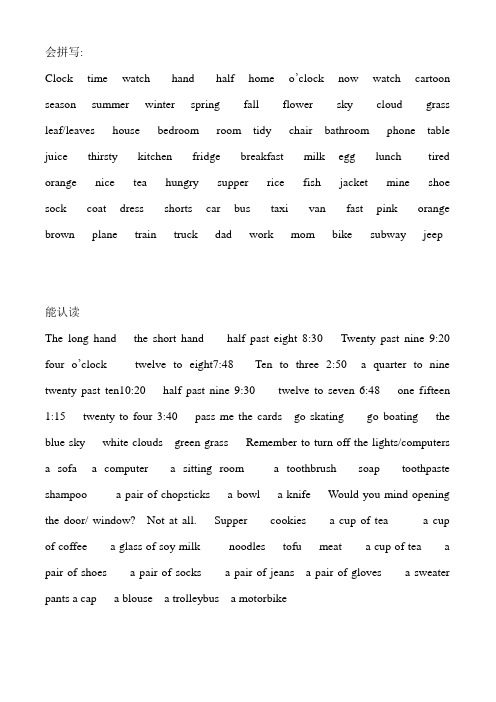
会拼写:Clock time watch hand half home o’clock now watch cartoon season summer winter spring fall flower sky cloud grass leaf/leaves house bedroom room tidy chair bathroom phone table juice thirsty kitchen fridge breakfast milk egg lunch tired orange nice tea hungry supper rice fish jacket mine shoe sock coat dress shorts car bus taxi van fast pink orange brown plane train truck dad work mom bike subway jeep能认读The long hand the short hand half past eight 8:30 Twenty past nine 9:20 four o’clock twelve to eight7:48 Ten to three 2:50 a quarter to nine twenty past ten10:20 half past nine 9:30 twelve to seven 6:48 one fifteen 1:15 twenty to four 3:40 pass me the cards go skating go boating the blue sky white clouds green grass Remember to turn off the lights/computers a sofa a computer a sitting room a toothbrush soap toothpaste shampoo a pair of chopsticks a bowl a knife Would you mind opening the door/ window? Not at all. Supper cookies a cup of tea a cup of coffee a glass of soy milk noodles tofu meat a cup of tea a pair of shoes a pair of socks a pair of jeans a pair of gloves a sweater pants a cap a blouse a trolleybus a motorbike1/ What’s this? It’s a clock. It tells the time. What’s that? It’s also a clock. It’s five o’clock now 2/.75。
二年级上册英语课文北京版

二年级上册英语课文北京版In the first unit of the second grade English textbook, students are introduced to various topics such as greetings, numbers, colors, and classroom objects. This unit aims to help students develop their listening, speaking, reading, and writing skills in English. Let's take a closer look at the content covered in this unit.The unit begins with a warm-up activity where students learn basic greetings such as "Hello," "Good morning," and "How are you?" They practice these greetings through role-play activities with their classmates. This activity helps students become familiar with common English greetings and encourages them to use them in daily conversations.Next, the unit focuses on numbers. Students learn to count from one to ten and practice saying and writing these numbers. They also learn how to ask and answer questions about age using the question pattern "How old are you?" This activity helps students develop their number recognition skills and enables them to communicate basic personal information in English.Moving on, the unit introduces colors. Students learn the names of different colors such as red, blue, yellow, and green. They practice identifying and describing objects of various colors in the classroom. This activity enhances their vocabulary and helps them develop their ability to describe objects using colors.In addition to greetings, numbers, and colors, the unit also covers classroom objects. Students learn the names of common objects found in the classroom, such as books, pencils, desks, and chairs. They practice using these words in sentences and learn how to ask and answer questions about the location of objects using prepositions such as "on," "in," and "under." This activity improves their vocabulary and enables them to navigate the classroom environment in English.Throughout the unit, students engage in various listening and speaking activities. They listen to audio recordings and practice listening for specific information. They also participate in pair and group activities where they ask and answer questions, shareinformation, and practice using the target language. These activities help students develop their listening and speaking skills while building their confidence in using English.To reinforce the language learned in the unit, students are given reading and writing tasks. They read short passages and answer comprehension questions. They also practice writing sentences using the target vocabulary and grammar structures. These activities promote reading and writing skills and provide opportunities for students to apply what they have learned.In conclusion, the first unit of the second grade English textbook covers greetings, numbers, colors, and classroom objects. Through a variety of activities, students develop their listening, speaking, reading, and writing skills in English. The unit provides a solid foundation for further language learning and encourages students to actively engage in using English in their daily lives.。
- 1、下载文档前请自行甄别文档内容的完整性,平台不提供额外的编辑、内容补充、找答案等附加服务。
- 2、"仅部分预览"的文档,不可在线预览部分如存在完整性等问题,可反馈申请退款(可完整预览的文档不适用该条件!)。
- 3、如文档侵犯您的权益,请联系客服反馈,我们会尽快为您处理(人工客服工作时间:9:00-18:30)。
北京版小学二年级英语下册(一年级起点)知识点梳理
教材共6个单元:
Unit one What time is it?(第一单元几点了?)
单元目标:1. 能够就具体时间及一些事情的安排做出询问、应答,并结合语境用”Let’s ... .”(我们一起……)初步提出建议。
2. 能听懂、认读time(时间), o’clock(整点), when(什么时候)及1、5、20、30、50等与时间相关的单词,并能在相应情景中结合具体动词短语进行运用。
3. 能根据字母a 在单词中发音为/æ/ (类似发音“爱”)的规律拼读单词。
4. 能理解对话内容,并能朗读对话。
Unit two What’s for breakfast? (第二单元早餐吃什么?)
单元目标:1. 能够用”What’s for breakfast?”(早餐吃什么?)“I’m hungry.”(我饿了。
)等日常交际用语询问他人就餐时间吃什么,点餐以及表达自己的情况。
2. 能听懂、指认并读出本单元有关食物和饮料的单词及短语。
3. 能初步感知名词的可数与不可数,尝试用a(一个), an(一个), some(一些), a cup of (一杯), a glass of(一杯)表达食物数量。
4. 能根据字母i 在单词中发音为/i/(类似发音“一”)的规律拼读单词。
Unit three Welcome to my house (第三单元欢迎来我家)
单元目标:1. 能在一定的情景中运用“Would you like to ... ?”(你愿意……吗?)礼貌地询问对方的意愿或发出邀请;能用”Can I use ... , please?”(请问,我可以用……吗?)提出自己的请求并做出相应回答。
2. 能听懂、认读有关餐具类的单词spoon(勺子), bowl(碗), chopsticks(筷子), glass (玻璃杯), dish(盘), fork(叉子), knife(刀子), 洗漱用品的单词towel(毛巾), soap(肥皂), shampoo (洗发剂), toothbrush(牙刷), mirror(镜子), 能听懂、认读有关人物日常活动的动词短语,如:come to my room(来到我的房间), read my books(读我的书), ride my bike(骑我的车), play with my toys(玩我的玩具), sit on the chair(坐在椅子上)等,并能在相应情景中运用。
3. 感知元音字母e及字母组合ea在单词中的读音/e/,能认读符合语音规则的单词,如:bed(床), pen(钢笔), red(红色)等。
Unit four Where is my shirt? (第四单元我的衬衫在哪?)
单元目标:1. 能用”Where is ... ? Where are ... ?”(……在哪?)询问某人某物在哪里,并用on(在上面), in(在里面), under(在下面), behind(在后面)做简单应答。
2. 能用”Is this ... ?”(这个是……?)“Are these ... ?”(这双……?这条……?)询问某人某物是否是对方的,并能用”Yes, it is.”“No, it isn’t.”和”Yes, they are.”“No, they aren’t.”做应答。
3. 能听懂、认读衣物类单词shirt(衬衫), coat(外套,大衣), dress(连衣裙), cap(帽子), jacket(夹克)以及trousers(长裤), shoes(鞋), shorts(短裤),socks(袜子), pants(休闲裤)复数衣物类单词。
4. 感知字母o在单词中的读音/ɔ/.(类似发音“奥”)
Unit five How do you go to school? (第五单元你怎么去上学?)
单元目标:1. 能够听懂、会说询问交通方式的相关功能句及其答语。
能够在真实情景中合理运用功能句式及固定短语就自己及他人的出行方式进行准确描述、询问和回答。
2. 能够听懂、认读表达出行方式的固定短语及表示地点、场所的词汇和固定搭配,并能够正确书写交通工具词汇。
3. 能够根据字母u在单词中的发音/ʌ/(类似发音“阿”)正确拼读单词。
Unit six Which season do you like?
单元目标:1. 能谈论季节,用” I like ... .”(我喜欢……)表达自己喜爱的季节,并简单说明理由或表达常做的事情。
2. 能听懂、指认并读出表达四季的词和表达活动的动词短语,如:plant trees(植树), go camping(去露营), pick apples(摘苹果), play in the snow(在雪里玩).
3. 感受字母组合ar在单词中的读音/a:/(类似发音“啊”)。
